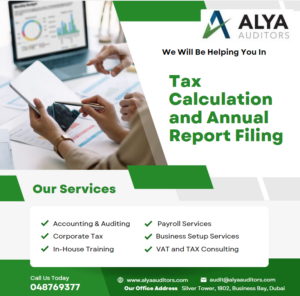
What Makes Alya Auditors One of the Top Auditing Firm in Dubai?
What Makes Alya Auditors One of the Top Auditing Firm in Dubai? In Dubai’s highly competitive business environment, companies must align with stringent financial regulations
Home » Common Reporting Standard (CRS) Filing Due Dates For DIFC Enties
The DIFC CRS is administered by the Registrar of Companies (“Registrar”) for all entities subject to DIFC CRS. Reporting requirements primarily concern financial services entities that are regulated by the DFSA, but certain non-financial services entities may be required to report under the DIFC CRS as well (please refer to Q8 in the FAQs for more information)
CRS as a reporting regime covers a broad scope across three dimensions:
In 2010, the United States enacted FATCA to increase income tax reporting by US taxpayers on assets held in offshore accounts and through “Non-US Entities”. FATCA imposes new reporting and withholding obligations on foreign financial institutions and certain other foreign persons which must be complied with in order to avoid a 30 percent US withholding tax on certain US-source payments and “passthru” payments that such non-US persons receive. The United Arab Emirates signed Model 1 B IGA on 17th June 2015.
All relevant DIFC entities are required to report annually, as per the MOF requirements mid-year in relation to both CRS and FATCA. DIFC Clients can submit the CRS return between 1 June and 31 July 2020 for DIFC CRS and FATCA reporting for the reporting period ending 31 December 2019.
DIFC Registrar of Companies has issued Guidance on DIFC CRS, explaining obligations, which entity types are or may be considered RFIs and how the overall DIFC CRS aligns with international standards set by the Organization for Economic Cooperation and Development.
DIFC also provides on this website FAQs and helpful links to CRS and FACTA resources.
While it is each DIFC entity’s responsibility to determine and action their obligations under DIFC CRS in order to ensure compliance, the DIFC will provide support by conducting outreach sessions. Below are FAQs to assist with high level information about CRS in DIFC.
“Custodial Institution” means any Entity that holds, as a substantial portion of its business Financial Assets for the account of others.
“Depository Institution” means any Entity that accepts deposits in the ordinary course of a banking or similar business.
“Specified Insurance Company” means any Entity that is an insurance company (or the holding company of an insurance company) which issues, or is obligated to make payments with respect to, a Cash Value Insurance Contract or an Annuity Contract.
“Investment Entity” means any Entity that:
Investment Entities are subject to CRS requirements. However, as the assessment in whether a DIFC entity falls into this category can be rather complicated, the following may assist in making such determination.
An Entity licensed by the DFSA as an Authorised Firm that is licensed to conduct one or more of the following Financial Services activities, may be classified as an Investment Entity for the purposes of the CRS Regulations:

What Makes Alya Auditors One of the Top Auditing Firm in Dubai? In Dubai’s highly competitive business environment, companies must align with stringent financial regulations

Why Dubai Businesses Need Expert Accounting Services in 2024 In today’s dynamic business landscape, Dubai continues to be a global hub for entrepreneurs and enterprises.

Corporate Tax Registration Deadline Alert If your business license was issued in August or September (any year), make sure to register for Corporate Tax by
To find out more, call us on +971 52 9750690 and speak to one of our audit experts.
Truly, let us know what service you are looking for and hence we can get back to you with more details.
Silver Tower, Business Bay. PO Box: 41102, Dubai, UAE.
Sharjah Airport Free Zone PO Box: 120403 Sharjah, UAE.
+971 48769377
+971 52 9750690 , +971 50 522 1035
Mon – Fri : 8:30 AM – 6 PM
Saturday – 9 AM – 5 PM
Sunday – Closed
© Alya Auditors 2022 All Rights Reserved